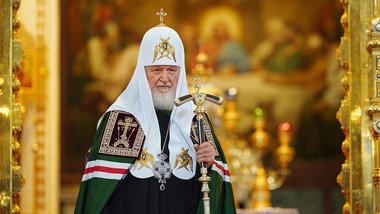Russian Orthodox Interview About New Catholic Dioceses
--According to information coming out of the Vatican, the status of the Catholic presence in Russia has been radically elevated by decision of the Roman pope. The apostolic administrations that have been existing hitherto have been transformed into dioceses, which henceforth will receive the designation of Roman Catholic archdiocese of the Mother of God in Moscow, the Roman Catholic diocese of the Transfiguration in Novosibirsk, the Roman Catholic diocese of Clement in Saratov, and the Roman Catholic diocese of St. Joseph in Irkutsk. Together they will henceforth constitute a church province which will be headed by Tadeusz Kondrusiewicz in the capacity of a metropolitan. How does the Russian Orthodox Church evaluate this step of the Vatican? --The actions taken radically change the status of the existing Catholic presence in Russia: the creation of a "church province" headed by a metropolitan on the basis of newly formed Catholic dioceses actually signifies the formation of an unprecedented structure, a Catholic church of Russia. Thus, new church structures of the Vatican turn out to be parallel to similar structures of the Moscow patriarchate, duplicating the sees of the ruling bishops of the Russian church in cities such as Moscow, Saratov, Irkutsk, and Novosibirsk. On its part, the Moscow patriarchate has never in Catholic countries created its own structures for pastoral work with the local population. Foreign parishes and dioceses of the Moscow patriarchate have been created for nurture of the Russian-speaking Orthodox flock in diaspora. Thereby our dioceses abroad have never had a missionary intent. This is well known in Rome and thus it is worthy of great amazement that the Vatican has reproached the Moscow patriarchate for starting to build an Orthodox church in Rome, which is a part of the Russian embassy, while at the same time in Russia it is opening dozens of Catholic churches. --Can the initiatives of the Vatican be a product of concern for the spiritual nurture of the recently growing flock of the Catholic Church in Russia? --Such an argument cannot be accepted since for the improvement of the pastoral nurture of Russian Catholics, who are not very numerous in our country, there is no need for a qualitative change in the previously existing structures of the Catholic Church. Thus, in comparison with the Russian Empire of the beginning of the twentieth century, the number of Catholic believers in contemporary Russia is immeasurably less and the level of the official representation of the Catholic Church in the country is incomparably and disproportionately exaggerated. It is superfluous also to note that of the twelve Catholic dioceses existing before the revolution, ten were located on the territory of present-day Poland, Lithuania, Ukraine, and Belarus, since earlier the Roman Catholic Church conducted nurture of a flock traditionally belonging the Catholic confession: Poles, Lithuanians and German Catholics. --In this case, what are the true motives of this change? If it is a regrouping of forces, what is the goal? --Insofar as the attempt of the Vatican to found in Russia new church structures does not depend on real pastoral needs, one can suggest only that there are missionary goals. This is confirmed by numerous cases of active missionary work of the Catholic clergy among the Russian population that has never traditionally belonged to the Roman Catholic Church. It is such activity that we view as proselytism and it is viewed by the Russian Orthodox Church as one of the basic impediments to an improvement of relations between the Moscow patriarchate and the Vatican. --Does all this signify a worsening now of relations between the official Vatican and hierarchy of the Russian Orthodox Church which even without this were quite bad? --The latest Vatican action is fraught with serious danger for the prospects of normalization of the relations that are currently strained. It is worth noting also that this decision was announced on the eve of the next regular round of official conversations between our churches that had been planned for the end of February. In addition, the Moscow patriarchate has maintained good and mutually respectful relations with many dioceses, parishes, and charitable and educational institutions of the Catholic Church. This leaves the hope for the possibility of overcoming the artificially created crisis in our relations. I suggest that the time has come for the Vatican to determine finally and to formulate exhaustively whether it sees in historic Orthodoxy of our country a competitor in a contest or whether it intends to follow along a path of inter-Christian dialogue and cooperation. The former represents a position that is unthinkable and impossible for equal and mutually respectful relations between the churches. The latter was and remains the object of concern and efforts of our church. Upon this, the sincere and responsible response of the Vatican, depends not only the future of the presence of the Roman Catholic Church in Russian society but also the place of Christianity in Europe and the world. (tr. By PDS, posted 12 February 2002) Source: http://www.russian-orthodox-church.org.ru/nr202124.htm








